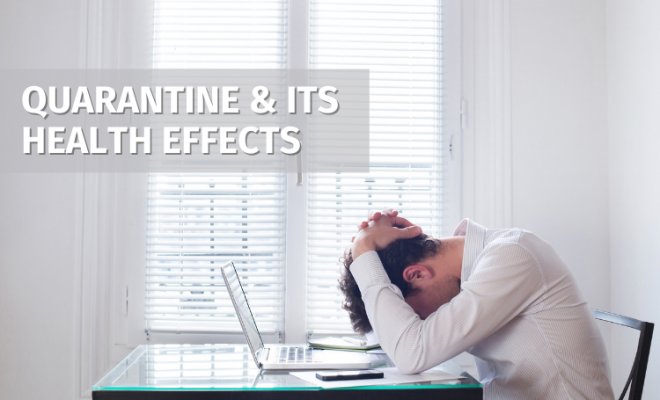Quarantine and its Health Effects

In addressing the COVID-19 virus pandemic outbreak around the globe, most countries use one of the common methods of self-isolation, medically and scientifically known as “quarantine”. Although it is a common method used around the world to curb the spread of the virus, it poses other health effects to individuals who are isolated. One of the major health effects is mental stress. Mental stress, when not managed appropriately, can lead to further development of chronic health effects, such as, depression and in extreme instances resulting in death.
Hence, it is important for individuals in isolation or quarantine to be monitored for signs of stress symptoms. Stress symptoms may include signs of dizziness, lack of concentration, mood swings, tiring easily, restlessness, temperamental behaviours, loss in body weight, loss of appetite, inability to think properly, and so forth. Those in quarantine or isolation, are normally alone and in an isolated place.
In such an environment, the individual can easily feel stressed due to loneliness and at times feel claustrophobic owing to the cramped space. It is therefore important, that the medical team monitoring the person under quarantine or isolation as well as the front liners and those along the chain, be well equipped with the knowledge of stress management. In addition, they need to be able to apply their knowledge to ensure that the quarantined person remains calm and unstressed.
In Singapore, the tracking system to identify individuals who are likely suspects of COVID-19 or even infected, are established through many avenues such as safe entry/exit scanning, identifying the connection interaction linkage through interviews, conduct of investigation, and so forth. Once the person is identified, the individual remains in quarantine or self-isolation, at their residence or quarantine facilities such as hotels, dormitories and so on.
Again, through the process of tracking and detection, the officer-in-charge needs to manage the expectation of the person who is receiving the news of an infection. The officer should be able to manage the person’s anxiety and even the stress or trauma that the person will undergo. It is best that these officers are trained and competent in stress management, to manage the individual’s anxieties and concerns, and keep them at ease.










